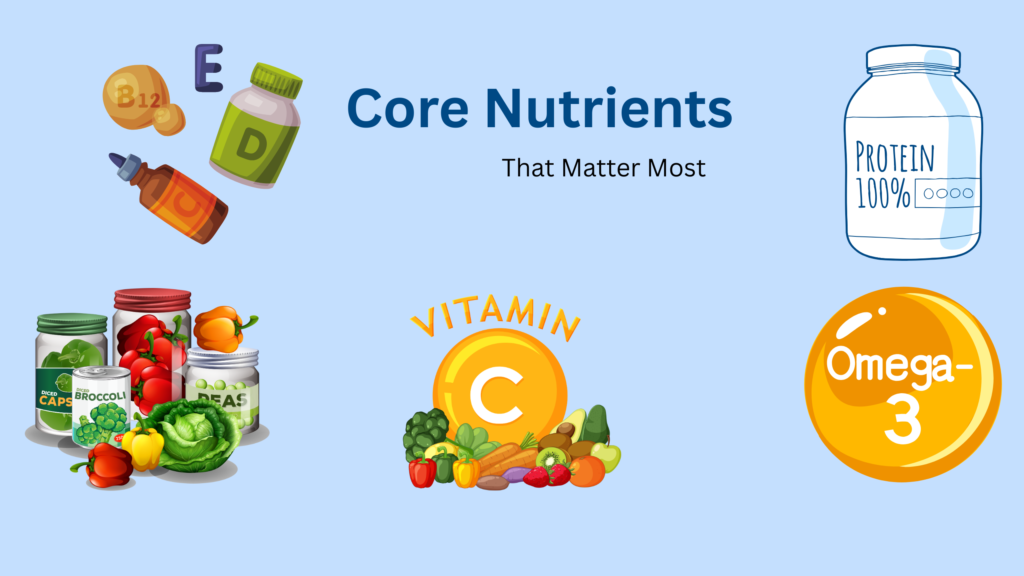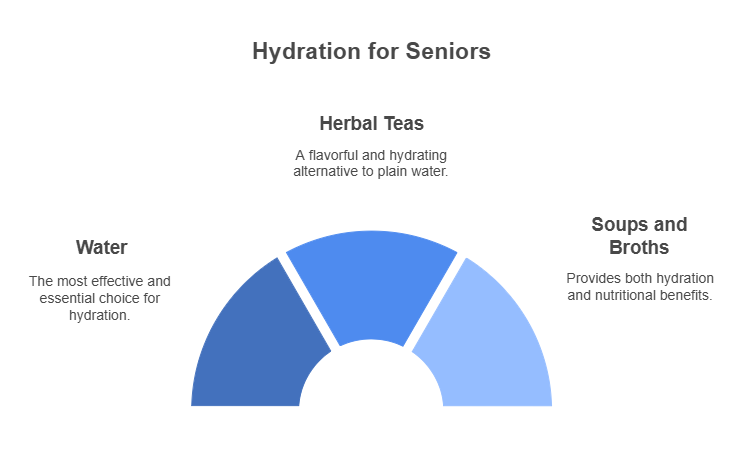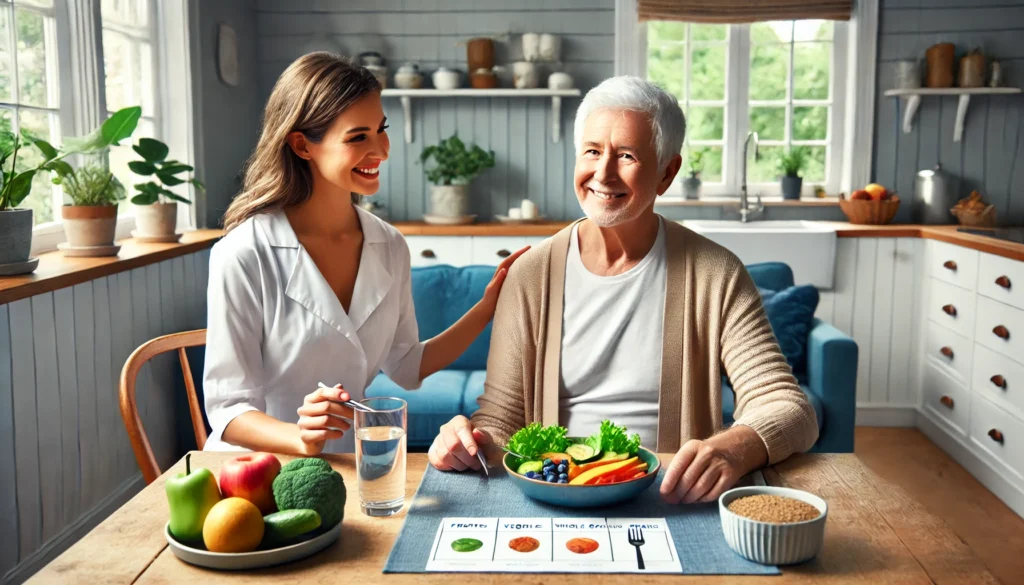Nutrition for Elderly
Helping older adults and their carers make easy, healthy food choices that support a better, stronger life every day.
Why Elderly Nutrition Matters More Than Ever
Getting older? Totally normal.
But eating badly doesn’t have to come with the territory.
As we age, our bodies change — how we digest food, how we absorb nutrients, even how we taste things. And honestly? A lot of people miss these signs. That’s when health problems start to creep in. The truth is, for older adults, food isn’t just about feeling full. It’s about staying strong, keeping your brain sharp, and holding onto your independence.
This guide shares what older bodies need to stay healthy, the everyday struggles many older people have with food, and easy ways to eat well without making things hard. If you’re caring for someone or looking after yourself as you age, this guide can really help.
The Nutritional Needs of Older Adults
The Science Behind Aging and Nutrition
As people ages 60 and older grow older, the body starts to change. Metabolism slows down, muscle mass declines with age, and taste can feel weaker. Because of this, many older adults need fewer calories but even more important nutrients. The body’s diet needs a shift, and following a healthy dietary pattern with a variety of foods becomes more important than ever. Compared to younger adults, older age groups need more vitamins and minerals to support healthy aging and reduce the risk of chronic disease.
A good diet helps maintain a healthy body weight, especially when combined with meals and snacks that match your nutrition needs. Nutrients are substances your body needs each day to stay strong.
Eating enough protein, choosing low-fat or fat-free options, and using fortified soy products can all help. You can always talk to a health care provider or check National Institute on Aging for clear nutrition information that fits your age group.
Core Nutrients That Matter Most
If you want to keep your energy up, protect your bones, and keep your mind in gear, focus on these heavy hitters:

- Protein: Helps you hang onto muscle and repair your body. Think lean meats, eggs, dairy, beans, and nuts.
- Calcium and Vitamin D: Your bones love this duo. Get it from dairy, leafy greens, and even a bit of sunshine.
- Fibre: Great for digestion and your heart. Load up on fruit, vegetables, legumes, and whole grains.
- Omega-3 Fatty Acids: Good for your brain and your heart. Go for fatty fish, flaxseeds, and walnuts.
- Antioxidants (Vitamins A, C, and E): Help fight inflammation and the wear and tear on your body. Found in colourful fruits and vegetables.
Real Challenges Seniors Face with Nutrition
1. Loss of Appetite
Lots of seniors just don’t feel hungry like they used to. This can be down to medication, loneliness, depression, or taste buds not working the same way. And when that happens, it’s easy to skip meals or not eat enough — which means not getting enough nutrients.
Try this:
- Make meals social when you can — even just a chat at lunchtime helps.
- Add herbs and spices to wake up those taste buds.
- Offer small meals more often, plus easy snack options that pack in nutrition.
2. Dietary Restrictions
Health stuff like diabetes, high blood pressure, or kidney issues can make food planning more complicated. Suddenly, you can’t eat this or that, and food becomes a puzzle.
Work around it by:
- Talking to a dietitian to get meals that work and taste good.
- Swapping out problem ingredients with healthy alternatives — like herbs for salt or fruit for sweeteners.
- Keeping meals simple but tasty so they’re easier to stick to.
3. Dental and Swallowing Difficulties
Tooth trouble, sore gums, or difficulty swallowing can really limit what someone can eat. And that often leads to skipping meals or avoiding food completely — not good.
Here’s what can help:
- Go soft: soups, stews, mashed vegetables, smoothies — easy on the teeth and the throat.
- Skip the tough stuff — no more chewy steaks or raw carrots.
- Keep up with dental care to make eating more comfortable.
Everyday Strategies for Healthy Eating
Smart Meal Planning for Seniors
When you plan ahead, meals get easier and less stressful. No last-minute panics over what to cook.
Here are some easy wins:
- Create a Weekly Menu: Mix it up with colorful, balanced meals.
- Batch Cook & Freeze: Big cook once, then enjoy stress-free meals later.
- Use Meal Delivery Services: Look into Meals on Wheels or local programs that bring the good stuff straight to your door.
Hydration: The Overlooked Essential
Lots of older folks don’t feel thirsty even when they’re dehydrated. Medications or just forgetting to drink can lead to serious issues.

What helps:
- Offer drinks regularly throughout the day — not just at meals.
- Add hydrating foods like watermelon, cucumber, and broths.
- Herbal teas and diluted fruit juices can keep things interesting.
Keeping the Menu Interesting
Same food every day = boredom = skipped meals. Keep it fresh and tempting.
Ideas to shake it up:
- Rotate what fruits and vegetables you’re using — go with the seasons.
- Try meals from other cultures — variety is exciting.
- Make it look good—colourful food is more inviting.
Special Diets Tailored to Senior Health
The Mediterranean Diet
It’s not just trendy — it works. This diet is all about fresh, whole foods and healthy fats:
- Fruit and vegetables
- Whole grains
- Olive oil
- Fish and poultry
- Nuts and legumes
Why it’s great: Supports your brain, heart, and joints. Plus, it tastes amazing.
The DASH Diet
Made to help with high blood pressure, this one focuses on:
- Low-sodium meals
- Plenty of fruit and vegetables
- Low-fat dairy
- Whole grains
- Lean protein
Why it works: It keeps your blood pressure in check and your meals nutritious without sacrificing flavour.
Navigating Nutrition for Seniors with Specific Needs
For Seniors with Diabetes
Keeping blood sugar steady is key. Focus on:
- High-fibre carbs like oats, beans, and brown rice
- Low-glycemic fruits like berries and apples
- Lean protein and healthy fats to keep energy stable
For Seniors with Hypertension
Too much salt is the enemy here. Go for:
- Potassium-rich foods like bananas, spinach, and sweet potatoes
- Beans, whole grains, and lean meats
- Avoid processed snacks and salty-ready meals
For Seniors with Dementia
Food can be tricky if memory or focus is slipping.
Tips that help:
- Reduce noise and distractions during meals
- Use plates that contrast with food so they can see what they’re eating
- Offer finger foods if cutlery’s a hassle
The Role of Caregivers and Community Support
Involving Caregivers in Meal Planning
Carers do more than just help — they can make meals better, more enjoyable, and more consistent.
Simple ways to involve them:
- Let seniors help pick meals
- Cook together if possible — it keeps things engaging
- Honor food preferences and cultural dishes they’ve loved for years
Community Nutrition Programs
Support is out there — and it’s helpful. Local centres, food banks, and meal programs aren’t just about food. They’re about connection.
Where to look:
- Senior centres
- Church groups
- Local charities offering food support
- Government-backed programmes
Small Steps, Big Impact
Eating well when you’re older doesn’t mean giving up your favourite meals or following a strict plan. As your nutrient needs and muscle mass change, small steps can still support a healthy diet. A few swaps — like drinking more water, adding veg to your plate, or adding flavour with herbs — can make a big difference. You don’t need fancy meals. You just need meals that help you feel better and support what your body needs to stay healthy.
Among older adults, health conditions, low appetite, or a weaker sense of thirst can make it harder to stick to a healthy eating pattern. Some adults 71 and older may also have different nutritional needs, which change how much they need at every meal. These changes happen slowly, but they matter.
Whether you’re using the MyPlate Plan, getting help from a carer, or checking with the Supplemental Nutrition Assistance Program, every small change can reduce the risk of developing more issues and support better food and nutrition as you age.
Key Takeaways
Good nutrition is vital: it keeps immunity strong, energy up, and life feeling good.
Essential Nutrients: Focus on protein, calcium, vitamin D, fibre, omega-3s, and antioxidants.
Common Challenges: Appetite dips, diet restrictions, and dental issues can get in the way.
Smart Strategies: Plan ahead, stay hydrated, and add variety to the menu.
Beneficial Diets: Mediterranean and DASH diets are both great options for seniors.

